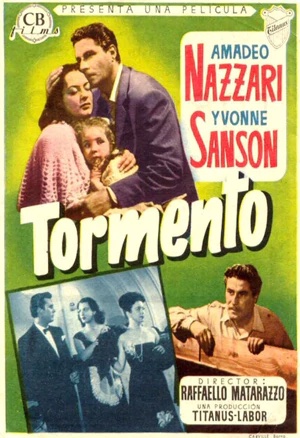After Catene, Matarazzo’s second film with Amedeo Nazzari and Yvonne Sanson, another sublime melodrama that moved the world
On each viewing, Matarazzo’s work reveals previously unnoticed riches and retains all its emotional strength
The words of Raffaello Matarazzo: “In my opinion, emotion isn’t easy or difficult. It’s either there or it isn’t. It either reaches the hearts of the audience or it doesn’t. And therein lies the problem: if it was so easy that everyone could move an audience, all the gold and diamond mines in the world would be nothing compared to such a guaranteed source of income.” Did Matarazzo possess that gift of moving audiences to tears. Did he ever! As demonstrated by the huge success of this, his second extraordinary melodrama starring Nazzari and Sanson, which followed the immense Catene. However, even if we try to list out all the ingredients required for a sure-fire success, we will still not be able to unravel the mystery of why Matarazzo’s films never go out of fashion, how they manage to reveal delicate new nuances on each viewing, and how their incredible emotional strength remains intact. There has to be something diabolical about them.
Persecuted by her wicked stepmother, Anna runs away from home to join her boyfriend Carlo, an engineer in Milan. He is unjustly imprisoned and she discovers that she is pregnant. She finds work as a dishwasher, but quits after the owner of the restaurant attempts to seduce her. When her young daughter gets sick, Anna has no choice but to seek help from her stepmother. In exchange, she is forced to hide herself away. Carlo gets out of prison and attempts to put his family back together.
After Catene, Matarazzo’s second film with Amedeo Nazzari and Yvonne Sanson, another sublime melodrama that moved the world
On each viewing, Matarazzo’s work reveals previously unnoticed riches and retains all its emotional strength
The words of Raffaello Matarazzo: “In my opinion, emotion isn’t easy or difficult. It’s either there or it isn’t. It either reaches the hearts of the audience or it doesn’t. And therein lies the problem: if it was so easy that everyone could move an audience, all the gold and diamond mines in the world would be nothing compared to such a guaranteed source of income.” Did Matarazzo possess that gift of moving audiences to tears. Did he ever! As demonstrated by the huge success of this, his second extraordinary melodrama starring Nazzari and Sanson, which followed the immense Catene. However, even if we try to list out all the ingredients required for a sure-fire success, we will still not be able to unravel the mystery of why Matarazzo’s films never go out of fashion, how they manage to reveal delicate new nuances on each viewing, and how their incredible emotional strength remains intact. There has to be something diabolical about them.
Persecuted by her wicked stepmother, Anna runs away from home to join her boyfriend Carlo, an engineer in Milan. He is unjustly imprisoned and she discovers that she is pregnant. She finds work as a dishwasher, but quits after the owner of the restaurant attempts to seduce her. When her young daughter gets sick, Anna has no choice but to seek help from her stepmother. In exchange, she is forced to hide herself away. Carlo gets out of prison and attempts to put his family back together.
